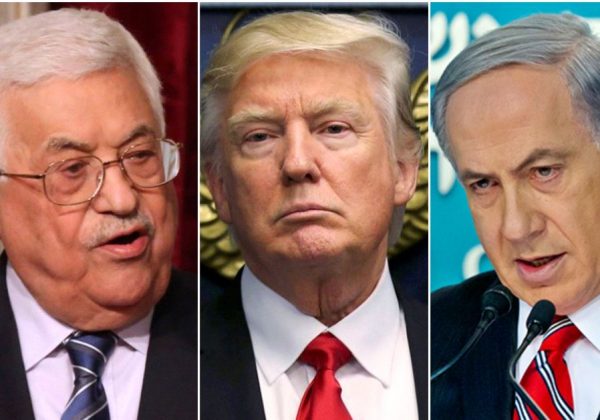 President Trump is pushing for a historic breakthrough between Israel and the Palestinians, but the lack of specifics in his approach has left some foreign policy experts scratching their heads.
President Trump is pushing for a historic breakthrough between Israel and the Palestinians, but the lack of specifics in his approach has left some foreign policy experts scratching their heads.
Trump’s son-in-law and senior adviser Jared Kushner will travel to the region on Wednesday. The administration’s special envoy, Jason Greenblatt, arrived in Israel on Monday.
The trip by the two men is the latest high-profile move from an administration that has displayed keen engagement on the issue.
Trump hosted Israeli Prime Minister Benjamin Netanyahu at the White House in February. The president of the Palestinian Authority, Mahmoud Abbas, visited in May.
Later the same month, Trump visited both men on their home turfs during his first major international trip. By contrast, his immediate predecessors, former President Obama and former President George W. Bush, did not visit Israel until their second terms.
Trump has also been bullish about the prospects of lasting peace, a quest that has thwarted all presidents, including those such as former President Clinton, who devoted considerable time and energy to the search. Trump has called an Israeli-Palestinian accord the “ultimate deal.”
In early May, during Abbas’s visit, Trump pledged to do “whatever is necessary” to forge a peace agreement. Later that month, in Jerusalem, he insisted that “I’ve heard it’s one of the toughest deals of all, but I have a feeling we’re going to get there eventually.”
But Trump has also been vague about the framework for an eventual deal — an approach that some seasoned observers see as troubling, even as others contend it shows an openness to new ideas.
The president has created doubt around some fundamental stances that have unified previous administrations.
In February, he declined to commit to the so-called two-state solution — the idea of sovereign Israeli and Palestinian states existing side-by-side— that has been the bedrock of all recent U.S. efforts to bring peace to the region.
“I’m looking at two-state and one-state, and I like the one that both parties like,” he said on that occasion. “I can live with either one.”
The comment sent shockwaves through a foreign policy world accustomed to parsing presidential announcements for even mild hints of a change in emphasis.
“That lack of clarity set the tone early on,” said Khaled Elgindy, a fellow at the Center for Middle East Policy at the Brookings Institution. “It has not been fully resolved, because he hasn’t explicitly stated that the goal is to have two states living side-by-side.”
For Elgindy, the uncertainty is emblematic of a larger issue.
“I think it is unclear what his framework is, what his vision is, for Israeli-Palestinian peace,” he said, “We know it is a priority, but we don’t know what sort of a process it is going to be.”
There is no real doubt that Netanyahu and his allies prefer Trump over Obama, with whom the Israeli prime minister had a tense relationship. But the president has backed away from some of the most pro-Israel positions he adopted on the campaign trail.
Plans to move the U.S. embassy from Tel Aviv to Jerusalem have been postponed, and Trump also criticized Israeli settlement-building in an interview with a Tel Aviv newspaper in February.
On the campaign trail, Trump vowed to move the embassy, but the White House opted to put off that decision in order “to maximize the chances of successfully negotiating a deal between Israel and the Palestinians.”
Moving the embassy would have “killed any new round of negotiations before they started … We’ve seen the same fuzziness on settlements,” said Hardin Lang, a senior fellow at the liberal Center for American Progress.
The bottom line, Lang added, was that “we really don’t know where the administration stands on key issues.”
But other voices insist that these pronouncements show flexibility rather than uncertainty. Some Israeli observers argue that Trump has been firmer with the Palestinians than Obama.
“The Trump administration is much more realistic than what went before,” said Danny Ayalon, a former Israeli deputy foreign minister who also served as the nation’s ambassador to the U.S.
Ayalon said he saw the Trump administration as essentially returning to the understanding that existed between former President George W. Bush and then-Israeli Prime Minister Ariel Sharon around 2004.
He also pushed back against those who argue that the White House is being too inexact about its plans.
Ayalon argued that the Trump administration is “not prejudging anything. It is not committed only to one possible solution or outcome, and I believe it is showing that maybe they are willing to think outside of the box.”
The presence of Kushner and Greenblatt at least underlines that the administration is not backing off its interest in trying to forge a breakthrough.
Ayalon called the duo, in addition to new U.S. Ambassador to Israel David Friedman, “people Israel can trust.” He added, “these are professionals, and they can make things happen. They are all very proficient in the art of negotiation.”
But skeptics believe the current situation in the Middle East might defeat even the nimblest of negotiators.
They point not only to perceived shortcomings on the part of the Trump administration but also to the internal politics of the region.
Abbas’s writ runs only in the West Bank, while the more hardline Hamas controls the Gaza Strip. Netanyahu’s Cabinet includes pro-settler politicians even more hawkish than the prime minister himself.
Elgindy, the Brookings expert, cited those dynamics in asserting that the chances for a breakthrough “are very, very low.”
He added, “I don’t see much room for optimism — even if we had clarity from the Trump administration.”
THE HILL

Leave a Reply
You must be logged in to post a comment.